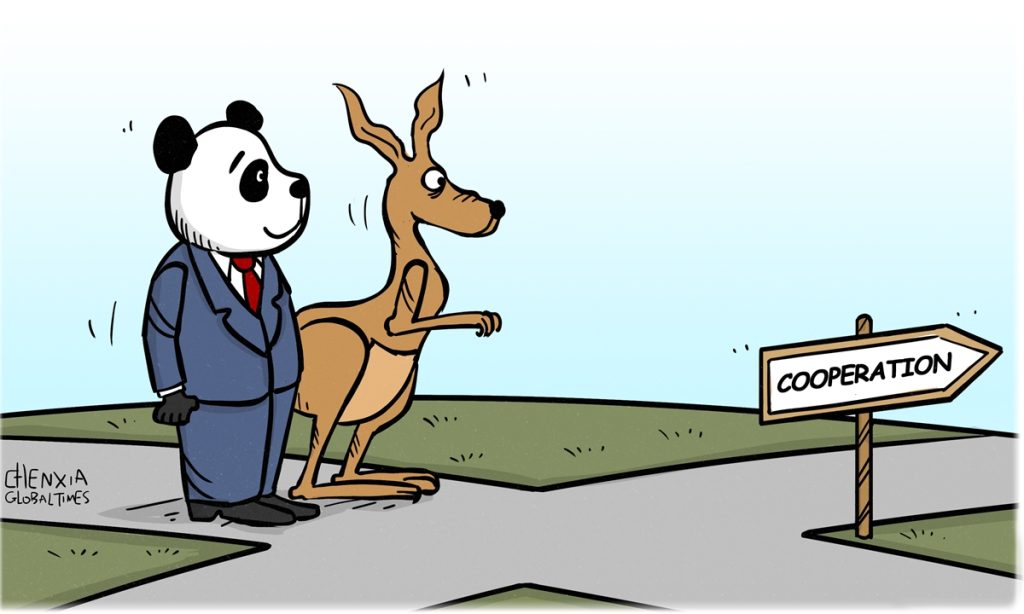Hope China-Australia dialogue can achieve results beyond expectations: Global Times editorial

The 7th China-Australia High Level Dialogue will be held in Beijing on September 7. This is not just a momentous event between China and Australia, but also a reflection of the East-West relationship as a whole. As a 1.5-track high-level dialogue initiated in 2014, this exchange is a thermometer for China-Australia relations. The interruption of this dialogue in 2020 was widely regarded as a prominent sign of the sharp decline in bilateral relations. After the Albanese government came to power and began adjusting its policy toward China, China-Australia relations rebounded. The restart of this high-level dialogue is seen as a sign of further warming of China-Australia relations.
This is the outcome that we are all hoping for. If China and Australia can effectively manage their disagreements while maintaining and strengthening mutually beneficial cooperation in the current international circumstances, China can do the same with other Western countries. From this vantage point, China-Australia ties have far-reaching ramifications beyond bilateral relations.
The ups and downs of China-Australia relations, from initially positive to being impacted by external circumstances and the growth of radical anti-China forces within Australia, to a more pragmatic adjustment by the Labor Party government, are extremely representative. It is obvious that Australia is primarily to blame for this. Therefore, when the Australian government changed, China-Australia relations ushered in an opportunity for a turnaround. The detours taken by China-Australia relations serve as a lesson not only for Australia but also for other Western countries in how to handle their relations with China.
It is essential to point out that most people who predict that China-Australia relations will improve are either Australians or members of Western public opinion. Although there is some optimism in China, it is cautious and constrained because expectations there are generally modest. This difference reflects the instability of trust between the two countries, and a "warming" without trust is difficult to sustain. We hope that at this moment of "restarting" bilateral relations, the Australian side should seriously listen to the thoughts of China, which is important for truly promoting the warming of bilateral relations.
From the perspective of the size and the composition of the Australian delegation, it is not hard to feel how much importance Canberra has attached to the restart of the dialogue. The large scale of personnel is uncommon compared to previous dialogues. The delegation is composed of representatives from both political parties, including former Labor trade minister Craig Emerson and former Liberal foreign affairs minister Julie Bishop, demonstrating the "political support" of both parties for this dialogue. The delegation members come from various sectors such as businesses, government, academia and media, all are familiar with China-Australia relations. We hope that the restart of this high-level dialogue also signifies the comprehensive restoration of the China-Australia strategic dialogue.
It is easier for things to slide downward than improve, the latter requires greater effort. It is the same in relations between countries. If we describe China-Australia ties as a student who started with score 80, yet the score has fallen to 40, we can say that the score improved a little now. Yet it is not enough. It requires more joint efforts from both China and Australia. It specifically requires Australia to overcome internal and external pressures to the greatest extent. Frankly speaking, Australia has not done enough in this regard and some mistakes are continuing.
Some Western countries, including the US, have repeatedly emphasized that they will not "decouple" from China while praising Australia as an "example" of "resisting Chinese coercion." The news of the high-level dialogue between China and Australia has received a lukewarm response from some Western media, which instead have been focusing on the country's new strategy to boost trade with Southeast Asia, proposed by Prime Minister Anthony Albanese at the ASEAN Summit, claiming that China's doubts are growing about the strategy. Australia has not withdrawn from the US strategy of containing China, nor has it shown such intentions. These pieces of information reflect the complexity of China-Australia relations.
One reality that both China and Australia need to face is that the urgent task of the current China-Australia relationship is to quickly reach a passing line. We have spoken enough to Australia in the past two years, but how much Australia can take in is not for us to decide. However, we have received Australia's sincerity in wanting to strengthen communication with China and will respond with goodwill. We hope that the high-level dialogue between China and Australia can achieve results beyond expectations.